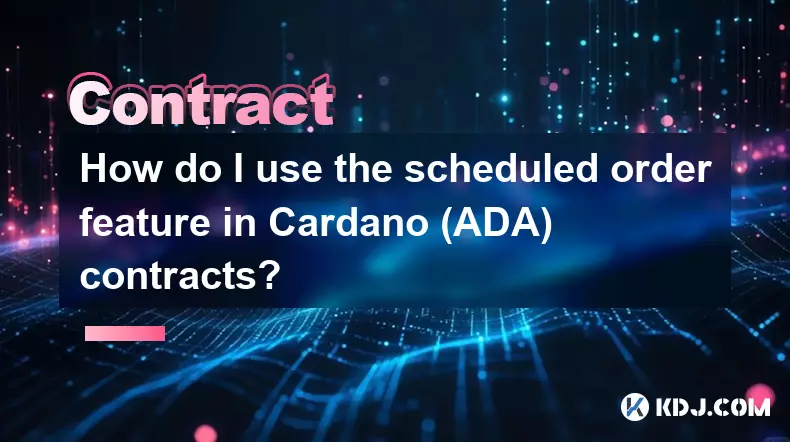-
 bitcoin
bitcoin $87959.907984 USD
1.34% -
 ethereum
ethereum $2920.497338 USD
3.04% -
 tether
tether $0.999775 USD
0.00% -
 xrp
xrp $2.237324 USD
8.12% -
 bnb
bnb $860.243768 USD
0.90% -
 solana
solana $138.089498 USD
5.43% -
 usd-coin
usd-coin $0.999807 USD
0.01% -
 tron
tron $0.272801 USD
-1.53% -
 dogecoin
dogecoin $0.150904 USD
2.96% -
 cardano
cardano $0.421635 USD
1.97% -
 hyperliquid
hyperliquid $32.152445 USD
2.23% -
 bitcoin-cash
bitcoin-cash $533.301069 USD
-1.94% -
 chainlink
chainlink $12.953417 USD
2.68% -
 unus-sed-leo
unus-sed-leo $9.535951 USD
0.73% -
 zcash
zcash $521.483386 USD
-2.87%
How do I use the scheduled order feature in Cardano (ADA) contracts?
Cardano enables scheduled actions via time-locked transactions and Plutus scripts, allowing deferred execution based on blockchain slots or timestamps.
Sep 28, 2025 at 10:18 pm

Understanding Scheduled Orders in Cardano Smart Contracts
Cardano operates on a proof-of-stakes consensus mechanism and uses the Plutus scripting language for its smart contracts. While native scheduled orders are not directly supported in the same way as centralized exchange features, time-locked transactions and conditional logic within Plutus enable developers to simulate scheduling behavior. These mechanisms rely on validators that check timestamps or slot numbers before allowing transaction execution.
- Transactions can be set to only become valid after a certain blockchain slot number, which acts as a time-based trigger.
- The Plutus framework allows scripts to validate whether the current slot falls within a predefined range.
- Users define these time constraints during contract creation, ensuring funds remain locked until conditions are met.
- Off-chain code components determine when to submit transactions based on real-world timing requirements.
- Integration with external services like Ogmios or Blockfrost helps monitor slot progression and automate submission.
Implementing Time-Based Conditions Using Plutus
Developers who wish to create scheduled behaviors must embed temporal logic into their validator scripts. This requires understanding of both on-chain validation rules and off-chain coordination.
- A validator script checks the validity interval by inspecting the 'validRange' field in the transaction context.
- Using the Slot.to POSIXTime function converts blockchain slots into human-readable timestamps.
- Constraints such as mustValidateIn ensure a transaction is only accepted within a specific timeframe.
- Emulator traces in Plutus Playground allow testing of delayed executions without deploying to mainnet.
- Custom endpoints trigger transaction construction once system clocks align with desired activation times.
Practical Use Cases for Delayed Execution
The absence of traditional order types does not limit automation possibilities. Real applications leverage Cardano’s deterministic execution model for predictable future actions.
- Vesting schedules for team tokens can release funds gradually over months using time-locked contracts.
- Escrow services hold ADA until a deadline passes or mutual signatures are collected.
- Subscription models charge users periodically by pre-authorizing recurring payments conditioned on slot height.
- Auctions automatically close when the blockchain reaches a specified end slot.
- DAO governance proposals execute outcomes only after voting periods conclude and timeouts expire.
Tools and Infrastructure Supporting Scheduling Logic
Building reliable timed operations demands integration between contract code and external monitoring systems.
- Blockfrost API provides real-time access to slot numbers and block timestamps for accurate scheduling.
- DApps use background workers that poll chain state and dispatch transactions when conditions are satisfied.
- Marlowe, a domain-specific language on Cardano, simplifies financial contracts with built-in timeouts and deadlines.
- Runtime environments like PAB (Plutus Application Backend) manage stateful interactions and event-driven triggers.
- Wallets supporting contract interaction can queue actions based on user-defined calendar times mapped to slot values.
Frequently Asked Questions
Can I set up automatic ADA transfers at a future date?Yes, through a smart contract that locks funds and only permits withdrawal after a defined slot number is reached. The transaction must be submitted manually or via a service once the condition is met.
Are there wallets that support scheduled transactions on Cardano?Currently, no major wallet offers native scheduling. However, advanced users can deploy custom Plutus scripts and use third-party tools to automate submission when time conditions are fulfilled.
How precise is time control in Cardano smart contracts?Time is measured in slots, each lasting one second. Actual block production varies slightly, so exact second-level precision cannot always be guaranteed, though it remains highly predictable.
Is it possible to cancel a scheduled action once initiated?Cancellation depends on the contract design. If the script includes an abort function requiring specific signatures, then early termination is feasible. Otherwise, the logic will proceed as programmed when conditions are satisfied.
Disclaimer:info@kdj.com
The information provided is not trading advice. kdj.com does not assume any responsibility for any investments made based on the information provided in this article. Cryptocurrencies are highly volatile and it is highly recommended that you invest with caution after thorough research!
If you believe that the content used on this website infringes your copyright, please contact us immediately (info@kdj.com) and we will delete it promptly.
- Bitcoin’s Wild Ride: Crypto Market Faces Price Drop Amidst Extreme Fear and Macro Headwinds
- 2026-02-02 12:30:01
- Ross Stores Dominates Off-Price Retail with Brick-and-Mortar Prowess Amidst Economic Shifts
- 2026-02-02 13:20:01
- Cong, Leviste, DOE Slap: Billionaire Faces $24B Penalty Amidst Renewable Energy Promises
- 2026-02-02 13:20:01
- Bitcoin Vulnerabilities Exposed in Brutal Crypto Crash, Highlighting Market Immaturity
- 2026-02-02 13:15:02
- Unlocking Fortunes in Your Pocket: UK Coins Could Make You £1,000 Richer
- 2026-02-02 13:15:02
- APEMARS, Crypto Presale, and MrBeast Coin: Navigating the Hype and Finding True Value
- 2026-02-02 13:10:02
Related knowledge

How to close a crypto contract position manually or automatically?
Feb 01,2026 at 11:19pm
Manual Position Closure Process1. Log into the trading platform where the contract is active and navigate to the 'Positions' or 'Open Orders' tab. 2. ...

How to understand the impact of Bitcoin ETFs on crypto contracts?
Feb 01,2026 at 04:19pm
Bitcoin ETFs and Market Liquidity1. Bitcoin ETFs introduce institutional capital directly into the spot market, increasing order book depth and reduci...

How to trade DeFi contracts during the current liquidity surge?
Feb 01,2026 at 07:00am
Understanding Liquidity Dynamics in DeFi Protocols1. Liquidity surges in DeFi are often triggered by coordinated capital inflows from yield farming in...

How to use social trading to copy crypto contract experts?
Feb 02,2026 at 07:40am
Understanding Social Trading Platforms1. Social trading platforms integrate real-time market data with user interaction features, enabling traders to ...

How to trade micro-cap crypto contracts with high growth potential?
Feb 01,2026 at 02:20pm
Understanding Micro-Cap Crypto Contracts1. Micro-cap crypto contracts refer to derivative instruments tied to tokens with market capitalizations under...

How to optimize your workspace for professional crypto contract trading?
Feb 01,2026 at 08:20pm
Hardware Infrastructure Requirements1. High-frequency crypto contract trading demands ultra-low latency execution. A dedicated workstation with a mini...

How to close a crypto contract position manually or automatically?
Feb 01,2026 at 11:19pm
Manual Position Closure Process1. Log into the trading platform where the contract is active and navigate to the 'Positions' or 'Open Orders' tab. 2. ...

How to understand the impact of Bitcoin ETFs on crypto contracts?
Feb 01,2026 at 04:19pm
Bitcoin ETFs and Market Liquidity1. Bitcoin ETFs introduce institutional capital directly into the spot market, increasing order book depth and reduci...

How to trade DeFi contracts during the current liquidity surge?
Feb 01,2026 at 07:00am
Understanding Liquidity Dynamics in DeFi Protocols1. Liquidity surges in DeFi are often triggered by coordinated capital inflows from yield farming in...

How to use social trading to copy crypto contract experts?
Feb 02,2026 at 07:40am
Understanding Social Trading Platforms1. Social trading platforms integrate real-time market data with user interaction features, enabling traders to ...

How to trade micro-cap crypto contracts with high growth potential?
Feb 01,2026 at 02:20pm
Understanding Micro-Cap Crypto Contracts1. Micro-cap crypto contracts refer to derivative instruments tied to tokens with market capitalizations under...

How to optimize your workspace for professional crypto contract trading?
Feb 01,2026 at 08:20pm
Hardware Infrastructure Requirements1. High-frequency crypto contract trading demands ultra-low latency execution. A dedicated workstation with a mini...
See all articles










































































